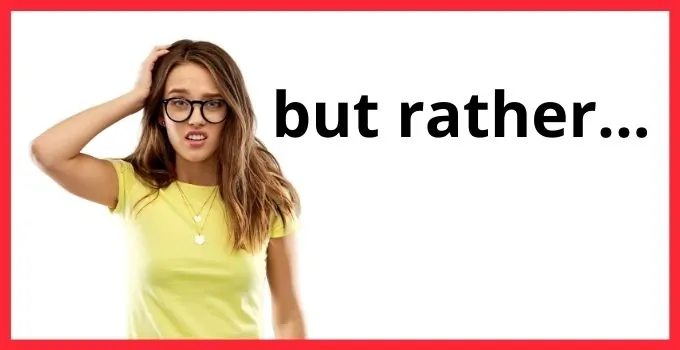Part of what makes writing so interesting is that it’s possible to do things which are stylistic choices rather than grammatical ones.
However, if you opt to add flavor to your writing this way, it’s important to know the grammatical rules involved as well.
One case in point is the phrase “but rather,” which is used to show contrast between two ideas.
If you’ve ever wondered about this phrase, read on!
How to use the phrase “but rather” in a sentence
The phrase “but rather” is used in a similar way to “however.” This phrase serves to show contrast between two ideas, and essentially means “on the other hand” or “in fact.”
To use this phrase grammatically in a sentence, a comma must be placed before the “but.”
Optionally, the word “rather” may be placed in between a pair of commas as well, although in practice this is not often done.
If you want to use just the word “rather,” you need to replace the comma and the “but” with a semi-colon, as “rather” cannot stand alone as a preposition.
Using “but rather” with commas
To use “but rather,” a comma must be placed before the word “but.”
This is because “but” is a conjunction and, with this particular construction, is only ever going to be used to connect two independent clauses in a sentence.
Much like with the word “then,” when a conjunction connects two independent clause a comma must be inserted before the conjunction in order for the sentence to be grammatical.
The word “rather” is technically a non-essential part of the sentence, meaning that its inclusion is not required for the reader to understand what is being said.
Because of this, “rather” can optionally be surrounded by commas.
However, because adding commas around “rather” is confusing and because “but rather” is somewhat of a stock phrase, most writers do not add the commas around the word “rather.”
Examples
“The banker was pleased not because he had earned a lot of money, but rather because the work day was over and he could go home to his family.”
Here, the contrast is emphasized by the phrase “but rather,” showing that the banker is not obsessed with money as we might first assume.
“The flowers do not smell sweet, but, rather, excrete a rotting smell to attract flies.”
The sheer number commas in this second example make it clear why authors often skip the optional commas around “rather.”
Again, these are technically grammatical but, because they do not aid in clarity, are often left out.
Why not just say “rather” or “but”?
The words “but” and “rather” both mean more or less the same thing and are used in effectively the same way in a sentence.
So why not just use one? Although “but rather” might seem redundant, that redundancy serves to emphasize the contrast between the two different parts of the sentence.
That said, you certainly can grammatically just use the word “rather” if you would prefer.
Rather without the but
If you want to just use “rather,” you will need to make sure that the word is preceded by a semi-colon, as in this case “rather” cannot grammatically follow a comma.
Note that “rather” can also be used in other contexts, and in some of these it may in fact require a comma.
However, when it comes to the phrase “but rather,” if you drop the “but” you absolutely need a semi-colon. This is because you are actually replacing the word “but” with that semi-colon.
Examples
“I didn’t order milk; rather, I asked for apple juice.”
“The military did not attack in order to conquer an enemy; rather, they were concerned for the safety of their people.”
Here, a semi-colon is used to show that these clauses are independent. Although the meaning is similar to “but rather,” there is arguably less contrast without the word “but.”
Alert! “Rather” can also be an adverb
Don’t forget that “rather” can also be used as an adverb to mean something like “very.”
If your sentence uses “rather” in this way, “but rather” is actually not a phrase because “rather” should be associated with the word that follows it.
In this case, you should absolutely not put commas around “rather,” as it is essential to the meaning of the sentence.
For example, “It is heavy, but rather small” uses “rather” as an adverb to describe “small.”

Hey fellow Linguaholics! It’s me, Marcel. I am the proud owner of linguaholic.com. Languages have always been my passion and I have studied Linguistics, Computational Linguistics and Sinology at the University of Zurich. It is my utmost pleasure to share with all of you guys what I know about languages and linguistics in general.

